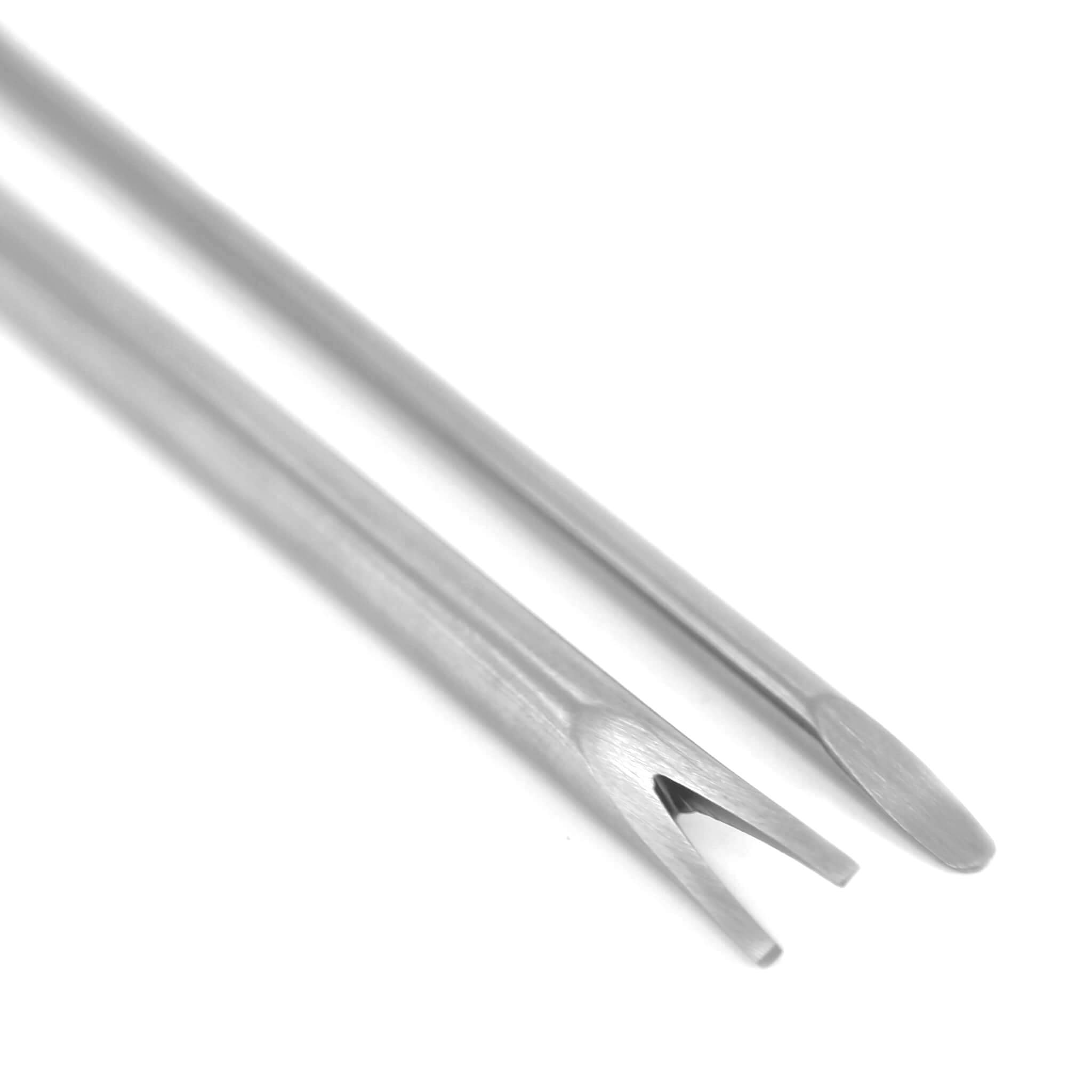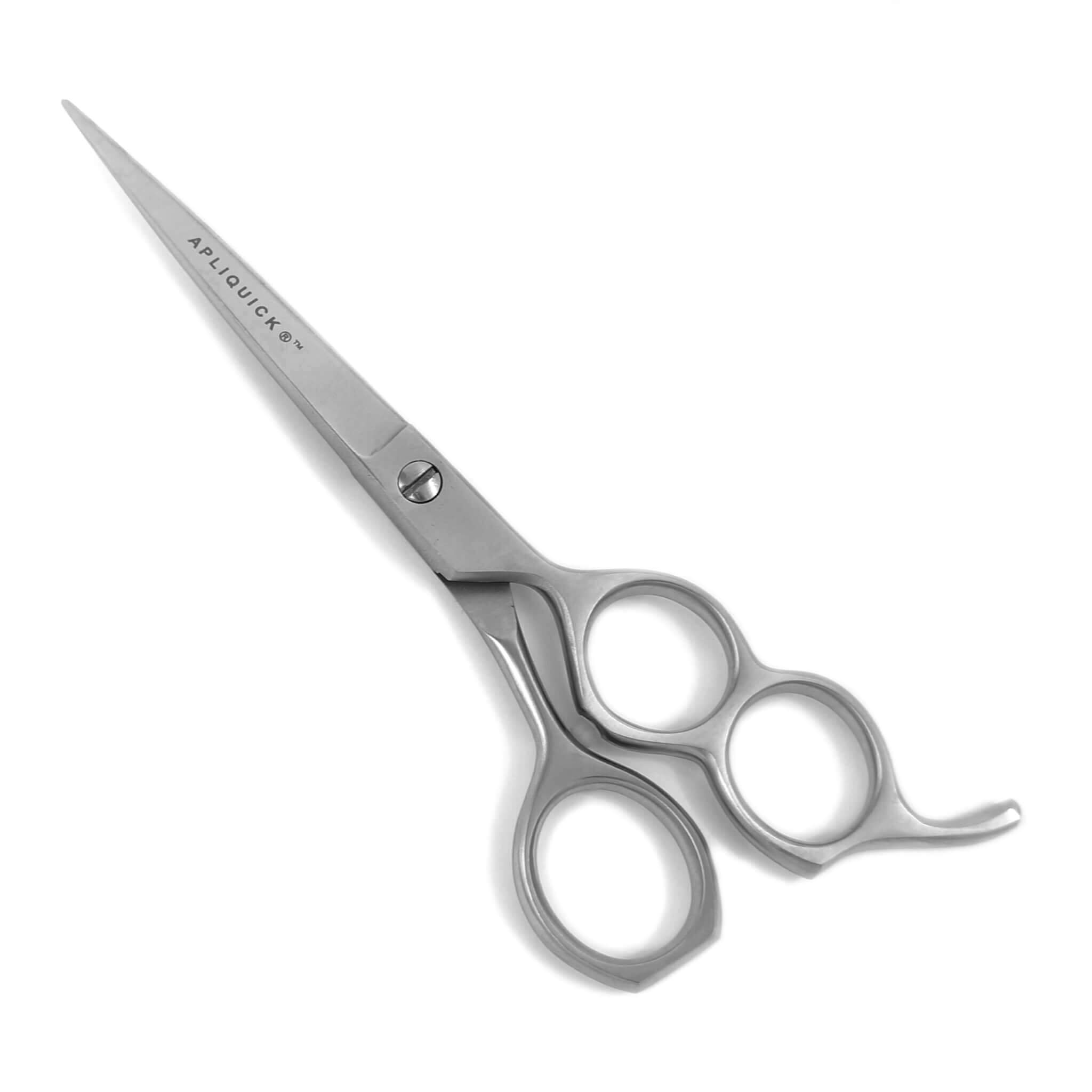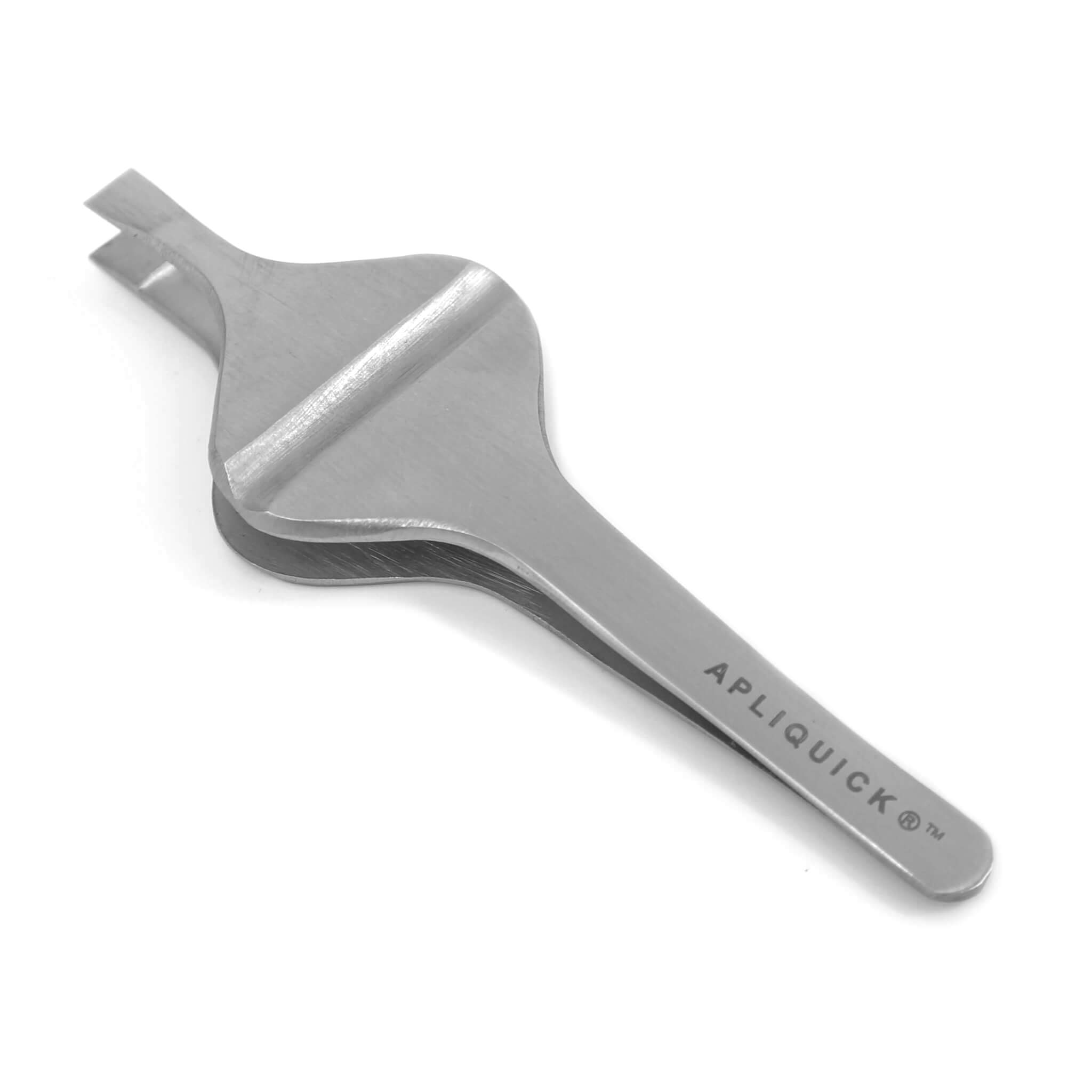We asked Ferret, a fabulous quilter from the UK, a few questions when we were designing her video. Here, basically unedited, are her answers. To view the video and see photos of her quilts, just click here. Enjoy!
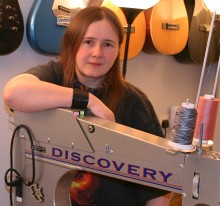
What is your background in sewing/design?
My background is really scientific. I studied Physics, Astrophysics and Space Sciences with a view to working in space. I'd been taught the basics of sewing as a child and grew up in a family where if you wanted something you made it. From furniture to clothes, rugs to car maintenance you did it yourself. My first guitar I made myself, starting with two slabs of wood. Fortunately I wanted an electric guitar, which requires a lot less specialist equipment than an acoustic.
After university I needed a suit for job interviews, but I didn't have the money. I decided to make one, of course I didn't have a sewing machine either, so hand sewing it was. I was very grateful to my boyfriend who helped me sew it. He should have run then as he is now making up whole quilts for me as well as typesetting all my patterns and books.
For several years after that I had neither the time nor the inclination to sew. I was busy working. However when we reached the point of having the time and money to go out, I discovered that I wasn't the shape that shops were making clothes for. Time to buy a sewing machine and start making some clothes. I quickly discovered that I really liked Victorian style clothes. This was great, except corsets and bodices are very inefficient at using fabric. I took the view that the fabric left over had cost the same per metre as the bits I had used and therefore I couldn't throw it away. I'd never seen a patchwork quilt but as I understood it they were designed to solve exactly this problem.
As you can imagine my first attempt was a little interesting. I didn't want to risk the really nice fabrics so I started with panne velvet and stretch sateen. I love all things celestial so the first blocks (not that I knew they were called that at the time) were star based. Can we say, bad idea?
When did you start quilting?
I think I started quilting in about 2002. It's hard to pinpoint exactly as I had been sewing for quite a while before then. As I said above my first attempt to get into quilting was a disaster. After that I did a lot of research before trying again. I quilted for quite a while before I realised that there were other quilters in the UK and that there were specialist shops. At the time very few had any web presence and working in IT that was always my first port of call for any information.
Is there quilting/design in your family?I don't think we have had any quilters in the family before me. There are certainly a lot of artists and designers though. My grandad, among other things, was an engraver. He worked on bank notes, and as I child I used to have play money he drew for me.
I remember the lectures about never taking it out of the house, because it was very accurately drawn. Sadly they were all burned, which whilst sensible is quite sad.
My gran was an artist. Drawing and painting mostly. However she did also enjoy needle work. She taught me a lot about various types of embroidery. I never mastered the crewel work she was so good at, but I did love doing crosstitch. Maybe it is closer to a mathematical
skill rather than an artistic one? I think the cross stitch has helped me a lot with planning quilting projects.
What quilters/sewers/designers inspired you and why?
I think the first quilter I noticed was Caryl Bryer Fallert. I was so impressed with her web site. I loved her work, it is so bright and alive but I was also struck by the idea that someone could be a professional quilter. She is also very free with information, you can learn so much about quilting from her site, including business issues most other people won't talk about.
Ricky Tims I first came across from his Caveman quilting DVD. I had heard people talk about him but I had come away with the idea they liked him because he was male, bit because of his work. His slack attitude towards rules and quilt police won me over instantly. I was very nearly late for a meeting because I just had to make a tulip before I went out. It was this relaxed outlook that made me so keen to have him write the foreword for my book. I still can't believe he agreed to do it.
I also have to mention Eleanor Burns. Her books gave me a great start in quilting. Again the casual attitude comes across and helps beginners not to worry too much. I also love her tip for getting all the loose threads off the carpet. She has probably save me more time than any other quilter.
Do you sell your quilts/designs?
In short, yes :) Many of my quilts are available for purchase. I do make some which I intend to keep, but in many cases just making the quilt is enough for me. As I do a lot of talks about my quilts I need to have a good supply on hand to take with me to these shows. Fortunately my quilts seem to sell at a similar rate to me making them, and usually it is earlier quilts that sell. It is almost as though my customers understand exactly what I need and supply it.
I am often asked if I mind selling my quilts. I don't. By the time a quilt finds it's new home I am ready to let it go out in to the world. I especially enjoy the sales where the quilt is going to someone with no other links to textiles. I have been surprised by how well my work is received outside the quilting world. One of the biggest surprises was 'Bad Rain'. 'Bad Rain' comes from a graphic novel written by a longstanding friend of mine, Cy Dethan. I had been hearing about the story for months before the book came out and when I saw the first sketches I was hooked. I was so lucky to get permission from everyone involved to use the image (a double page spread from the book) to make a quilt. I did make it largely for my
own satisfaction but we thought we would try showing it at comics conventions. I wasn't expecting it to be popular but I was thinking it would attract some interest for the book. I was so wrong. The young men at the show were fascinated. They were often more interested in the quilt than the book, and not just because of the content. They wanted to know how it was made and where they could learn to do it. Sadly there really isn't anywhere they can be
taught, but they are at least aware of quilts. I hope this quilt will draw a lot more people into quilting before it is sold on.
I also sell patterns and have recently written my first book. I am very lucky to have a typesetter in the family. My boyfriend not only does all the design for the pattern layouts he also tests the patterns. When I wrote my book 'Ferreting Around' I had about 30 students testing it. I was reasonably happy that a test group of that size would have found most of my errors (and they certainly did find a lot). Tet started work on my book and corrected my spelling and grammar. It occurred to him that that was only part of the story. The only way to be sure the book would work for people who didn't have me around was to work through it. He threw me out of my sewing room, grabbed my stash and sewing machine and got to work. He found a lot of things that needed changing to make the book more user friendly for beginners, and a fair number of definite errors. After that experience, he is now going through the same process for each pattern I write. It does make it slower getting the pattern to press, but hopefully it means a much better finished product.
Have they/will they be exhibited?
Yes and yes. I've been entering shows for a few years now, partly so I get to have a good look at my quilts, my house is too small to hang most of them. I had my first solo gallery show in 2008, and a lovely little gallery in a chapel. I had heard about it on a quilting form. A lady was saying she knew this great gallery that didn't get as much use as it should. Well turns out people weren't using it because it was attached to a cemetery! I thought it was an amazing space in a lovely location and I really enjoyed putting on a show there. I loved meeting lots of
new people many of whom were seeing quilts for the first time. Their response to my work was fascinating. I did have a fair number who asked where the paintings were, and a lot more who complimented my painting (all of my work is appliqué none of my quilts have any painting on them). I also had many who did understand what they were seeing and were fascinated by the idea that you could make quilts without hexagons. Hexagons over paper have been the quilt of the UK for way too long.
Last year I was given a huge gallery space at the Festival of Quilts in Birmingham, the largest show in Europe. It was a fantastic opportunity and very daunting. I wanted long sightlines and lots of space as I work large, but I hadn't expected as much space I was given. I wasn't going to turn it down though and managed to make 17 quilts between January and August last year. The gallery was so busy during the show I didn't notice it was busy the first day. From my point of view I was testing my longarm, which I had in the gallery when the doors opened. A lady came and talked to me. Then another, and then a few more one after another. Then somehow it was 4pm. My helpers tell me the stand had been full all day, I had never seen more than one or two people at a time, it was a very odd feeling. From talking to people after the event I think one of the big things that drew people to my stand was the noise. Most of the hard walled galleries at the show are rather like libraries. Groups walk in, look around, leave and talk. I have no idea why they react like this, but they do. My stand had the machine on it, and it isn't quiet, anyone trying to talk to any of my helpers was likely to be doing it loudly, so straight away it was clear this gallery was different. Apparently a lot of people found it by following the laughter and chatting, which I though was lovely. I hope they liked the work once they got to me, but the idea that we could encourage people to interact with each other than the people manning the stand (two of whom weren't even quilters) is great. I hope to hear more galleries this year at the show.
a time, it was a very odd feeling. From talking to people after the event I think one of the big things that drew people to my stand was the noise. Most of the hard walled galleries at the show are rather like libraries. Groups walk in, look around, leave and talk. I have no idea why they react like this, but they do. My stand had the machine on it, and it isn't quiet, anyone trying to talk to any of my helpers was likely to be doing it loudly, so straight away it was clear this gallery was different. Apparently a lot of people found it by following the laughter and chatting, which I though was lovely. I hope they liked the work once they got to me, but the idea that we could encourage people to interact with each other than the people manning the stand (two of whom weren't even quilters) is great. I hope to hear more galleries this year at the show.
I am trying to get back into the swing of entering shows, but I am so busy it is hard to keep on top of the deadlines. Phoenix Rising is currently and the Lancaster show though, I can get the forms in on time sometimes :) This year I have been invited to be part of a UK vs Russian fashion show at Birmingham, and that will be taking up a lot of time
too. I am hoping to organise another gallery show but at the moment it is lower on my priorities than eating and sleeping, sorry.
What are you working on now?
Right now I am mostly working on clearing the backlog of customer work so I can get back to my own work. I have another book on the go. This one will cover the techniques I use in making my art quilts. I am also working on a lot more patterns. As I mentioned
above I have some clothes to make for August. I have the patterns chosen and in most cases the fabrics ready to go. I just need to actually start putting them together. I can say that one will be a coat and another Victorian based.
I've recently done a very heavily quilted wholecloth and I would love to get another made in time to enter Houston. Unfortunately I don't think I am going to manage it. Judging form the samples it would be 2 months solid work and I just can't see how I will fit that in. What I need most right now is more hours in the day. I have so much I want to be doing and there is so little time to fit it all in.
Which machine/machines do you use?
I use a Husqvarna Sapphire for my piecing and small quilting projects. It's the one time a sales man has been able to back up his bragging. I moved too close to a stand at a show and a sales man declared he had the perfect quilters machine. I didn't quite call him a liar, but I did mention how much I didn't believe sales pitches. I tried his machine and declared it OK, but missing some features. A few months later the new machine appeared with everything I had wanted and I was sold. I work my machines very hard but it's taken everything I can throw at it.
My longarm is an APQS Discovery. I chose it largely because of the very neat welding. You try growing up being lectured about the the importance of neat welds without that becoming a requirement. The machine and I took quite a while to become friends but it is now,
as your ads say for Gammil, "my best quilting buddy". I make it do things it was never designed for but it does it. It's set up to move a lot more easily than most longarm machines which I think goes a long way to letting me quilt the way I do, and for the length of time too.
When did you first decide to start entering quilt contests?
Technically I didn't decide to. The lady who runs my local quilt shop told me to and she is the sort of person who you obey first and think later. The show was the UK National Quilt Championships in 2005. In hindsight I am very glad she did tell me to do it. I didn't get a chance to think about it and once you've started it's a lot easier to carry on. Over the years she has helped me a lot, including trying to talk me out of making quilting my business. She was right about everything she said, but when it became clear I wasn't going to listen to sense she switched to helping me out any way she could. I still teach (her fault) at Patchwork Corner (www.patchworkcorner.co.uk) regularly.
Do you remember the first contest you entered and which quilt it was?
Oh yes, does anyone forget that? I suppose you might if you started young but for me it was a big deal. I actually entered two quilts in the first show. 'Star of Scotland' and 'Skadi' (both are on my website). 'Star of Scotland' a lone star quilt from the book "Lone star quilts and beyond" by Jan Krentz. Before it I had made several quilts from Eleanor Burns books and I had got the idea that you just follow the steps in any quilt book and a quilt pops out. Well that's true provided you have the skills needed for the project. I really didn't when I started the quilt. I also didn’t know you aren't supposed to quilt 100+" square quilts on a domestic machine, that metallic thread is an nightmare or that the show stand could only properly display a quilt 90"x90". It looked terrible at the show,
not helped by the fact I had used wool wadding that let the quilt drape like a curtain.
Skadi did a little better, but more of that on the next question.
How did you feel the first time you won a ribbon/prize? What was it for?
Well I suspect you can guess the answer, 'Skadi' was my first award winning quilt. I was mostly shocked when I first found out. I am assured my face was a picture. I was thrilled, but I didn't really believe it. I can remember trying to rationalise how its ribbon

must really belong to another quilt. The really special part though was when I was talking to one of the traders at the show. There was a lady there who specialised in portraits of big cats. I'd admired her work before and stopped to do so again. She said that if I like her work I should go and take a look at one of the contest quilts, a cat called 'Skadi'. I couldn't believe it. Someone who did such amazing work was recommending my quilt as a one to see! It turned out she had been one of the judges and not only could tell me what I had got right but also explained why I had a second not a first. She was the most helpful judge I've ever had look at my work. I learned a lot that day. I just wish I could remember her name. I am terrible with names and it drives me nuts. I should also admit that I still do the thing that lost me the first place that day. I like to leave one narrow border unquilted on many of my quilts. I am told this is wrong and I should quilt consistently over the whole quilt. Well ! I like the puffy bits and I will keep them. Nah, nah na na nah. I would rather make the quilts I love than make the quilt the judges and quilt police want.
Is there an award you are particularly proud of winning or a quilt you are happy to have completed?
My first award from each show is special. The above award probably more than all of them, not only because it was the first but
because of who happened to judge it. Some of my American awards have been the most unbelievable. Particularly the visitors choice at Houston. I heard about that on an email list. A lady on an international list congratulated me on my award at Houston. I was
sure I hadn't won anything and on checking the winners list online found I was right. I wasn't too worried. I emailed her, explaining I thought she had made a mistake and waited for the correction to appear. It wasn't likely to be read by many people before she got up so I was prepared to sit tight and ignore it. Well less than an hour later someone posted about it on a UK list. Not so good, the UK was awake and reading email, what should I do? I didn't want to be seen to be taking credit for an award I hadn't won and I was sure I
hadn't but at the same time I didn't want to publicly point out someone’s mistake, I'd rather they had the chance to correct it. It was a very stressful day until I was chatting to a lady who had been at the show (about something else entirely) when she congratulated me. I said I thought she was mistaken but she was adamant, it had bee announced and I had won an award. I still couldn't get my head around it, it had to be a mistake. Well it turned out it wasn't and I am so proud of that quilt. I had to check the winners list several times before that one sunk in too.
I think the quilt I was happiest to complete was 'Phoenix rising'. It was the quilt the whole of my gallery at the Festival of Quilts was based around but it was the last one to be finished. 2008 was a difficult year for me and the phoenix represented that. It was a quilt I really needed to get out, but it didn't want to be worked on. I kept putting it off, and with a week to go I had to start it. The binding on that was the last one I did the night before we hung the show and it felt right. It was the quilt that needed to be last to kind of collect everything else together and signal the show was ready. It was a strange but lovely experience.
Another very important award for me was my first longarming award. It's for an art quilt, which is quite special, but more important was the person who sponsored the award. When I first got my longarm she got in touch and offered to help me with my problems. When I drove down to see her it turned out she was having chemo therapy again as was really ill. She chose to spend her time helping me

though when I really needed it. I didn't know until several weeks after I received the award that it was hers. She didn't judge it but always went to check she approved of the winner. Mine was the last quilt she got to do that for, she died shortly after that show. I've since gone on to win the Best traditional machine quilting at the world quilt show, but it isn't a patch on the first award for
meaning to me. Fran Jones also told me that no matter how small the piece once you are a longarm quilter you should do everything on your frame (sorry Fran I don't always) so in her memory I made a set of postcards, each mounted individually on my frame to raise funds
for cancer research. I think it would have amused her to see something that small mounted on that big a machine.
Can you share some of the process behind the inspiration and making of your winning quilt?
Wow that's an open ended question, which award winning quilt?
'Skadi' my first award winning quilt is pretty important. Not just because she was my first winning quilt, but also because she nearly never happened, and without her there wouldn't have been any of my other pictorial quilts. I learned the techniques for her from Marilyn Belford in her class 'Realistic fabric portraits' at www.quiltuniversity.com. The class was supposed to be about making a quilt of a human but I didn't want to do that. Marilyn wasn't convinced about doing an animal but eventually let me and worked with me to make it a success. I a so grateful she did. I learned an awful lot from her. The photograph I used was taken while Skadi was sitting on the lonestar quilt that was in the same show. I didn't really appreciate her doing it but she looked so cute I just had to take a picture. I have 6 cats and as time permits I will do portraits of all of them.
'Guide Me' was something completely different for me. I love traditional quilts and I enjoy playing with the ideas and moving forward with them. I had known I wanted to do a whole cloth but I couldn't really see me doing a totally traditional white on white quilt. If nothing else I find white very hard to work with. So I started thinking. What if I took a traditional block design and a traditional wholecloth, where could I take it. I initially considered an black on black wholecloth but I realised it the lighting at a show was anything less than stunning the design wouldn't show. This lead me to thinking about contrast and value. Maybe I could use white on black (too stark) or red on black. Then it hit me. I could

use the thread to colour in different areas. I had actually designed this compass to be a pieced quilt but it was going to be a lot easier to make as a whole cloth so that is what I did. The only marking for this quilt was the straight lines. I then filled in each area with a different pattern and colour. I had so much fun making this quilt that I have made several more on the same theory and I use the idea as one of my classes for encouraging people to try more machine quilting.
Another quilt people often ask about is Herd Mentality. This quilt is from a photograph I took when out walking a friends dogs. The friends father had asked me if I minded cows. I told him I didn't and headed off. Well these cows were getting very friendly and wouldn't back off. At one point I looked around to find one was

putting it's front leg over my shoulder. I
decided that it was time to be else where and left the field. From the other side of the electric fence I took a good look at them. They had entirely the wrong attachments to be cows. I would have thought a farmer would understand there is a big difference between male and female cows. I can't complain though, this quilt has been very successful for me.
It's first competition was at the Festival of Quilts, where it collected two awards allowing me to collect 5 with 4 quilts at that one show. I think it makes up for the 'cows' behaviour.
An additional question we asked Ferret later –
What can you tell us about your hot rod/race car quilts?
 My other half races a Ford Capri, and I am his crew. While I am at the track I do my hand sewing on the show quilts. I love cars and I spend a lot of time photographing them. I then saw a music video by Queens of the Stone Age. Then the idea struck, very minimalist dragsters. The rail was the first one I made. I worked on it when I have an evening home alone, and when Tet (my other half) came home he managed to identify which car it was. I wasn't sure it would be possible given how much I had simplified it, but he spotted it a Dave Wilson, who drives in Top Methanol Dragster. The second one is much more distincive, and is Andy Robinsons Pro Mod. I love this car because of it's face. I did show each of the quilts to the drivers. It turns out that Andy has quilters in the
My other half races a Ford Capri, and I am his crew. While I am at the track I do my hand sewing on the show quilts. I love cars and I spend a lot of time photographing them. I then saw a music video by Queens of the Stone Age. Then the idea struck, very minimalist dragsters. The rail was the first one I made. I worked on it when I have an evening home alone, and when Tet (my other half) came home he managed to identify which car it was. I wasn't sure it would be possible given how much I had simplified it, but he spotted it a Dave Wilson, who drives in Top Methanol Dragster. The second one is much more distincive, and is Andy Robinsons Pro Mod. I love this car because of it's face. I did show each of the quilts to the drivers. It turns out that Andy has quilters in the
family, who are also his crew. They seemed quite inspired by the quilt as until they saw it they had only seen traditional quilts.
The third car is K.I.T.T from Knight Rider. He was my pin up as a teenager and was one of the first art quilts I made. I didn't actually get it quilted though until just before the show. I knew I needed something else to fill the wall with the dragsters and this fitted perfectly, but in content and size.



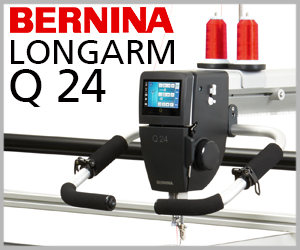
.jpg)
